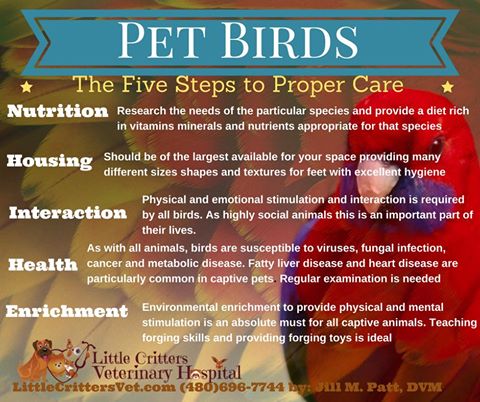Little Critters Veterinary Hospital
1525 N Gilbert Road Suite #C-101Gilbert, AZ 85234(480)696-7744
www.littlecrittersvet.com
Bird Care Introduction

The initial information was written some time ago by exotic veterinarian, Jill M. Patt, DVM and while much of it is still very applicable to bird care in general, she is currently updating all of these pages. Keep checking back for the latest information on Bird Care.
|
|
|
INTRODUCTION:
Birds are fascinating, beautiful, incredible creatures that I have chosen to share my life with. I’ve enjoyed keeping and raising birds for as long as I can remember and they are greatly responsible for my becoming a veterinarian. While I love these critters, I also understand how difficult they can be to live with & care for properly. Before anyone acquires a pet bird they need to understand what they are getting into. Never acquire any type of pet on an impulse and especially a bird. Studies have proven that birds are much more intelligent than our other commonly kept pets and they also are very long lived. These two factors often contribute to some of the problems we see in avian veterinary medicine. Because birds are so intelligent, they need regular mental and physical stimulation and lack of this commonly leads to behavioral disorders such as feather picking and skin mutilation. Their intelligence can also get them into trouble. As an example, it is not uncommon for a bird to learn that when they scream the owner comes to the cage and they quickly become attention yellers. Also, because they often live for decades on very poor diets, we regularly see diseases associated with severe malnutrition. Therefore, I encourage anyone considering acquiring a bird to become thoroughly educated in the needs of the bird prior to bringing your feathered friend home.
|
|
Veterinarian:
Your avian veterinarian should be one of the most important aspects in providing your bird with a long and healthy life. I highly recommend establishing a relationship with a veterinarian the first day you acquire your new bird. Additionally, all birds should be examined at least yearly by a veterinarian and I recommend regular lab screening as well. The lab screening will vary depending upon what the veterinarian feels is important but typically includes a fecal panel, complete organ panel, and a look at the red and white blood cells. The importance of this cannot be overstated. Birds are notorious for not showing signs of illness until they are critical and a good way to catch them in the early stages of any disease is with basic lab screening. Another benefit of lab screening is for the establishment of normal values for your individual bird. This becomes important when your bird is ill because we have those baseline values to compare the current results to. This allows your veterinarian to determine the longevity of the disease and also helps to allow them to focus on the changes that are of most importance. If I could do only one thing with this web site, it would be to enforce the importance of a good relationship with your veterinarian. Your bird will never get better care then by seeing someone who knows him/her and most importantly knows what is typical for your bird, both in behavior and laboratory results.
|
|